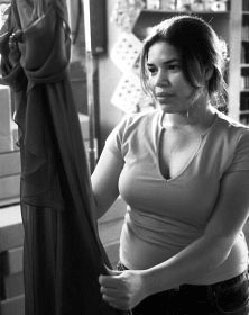 |
|
Photo courtesy of HBO Films
|
America Ferrera plays a Mexican-American girl growing up with her blue-collar family in East Lost Angeles in a new movie from HBO films, "Real Women Have Curves." The film is currently playing throughout the Tucson area.
|
|
By Mark Betancourt
Arizona Daily Wildcat
Thursday November 14, 2002
We all mourn the death of a great art form. This cornucopia of rich images brimming with knowledge and self-worth for all, its subtle poetry, its stark reflection of the lives we did not know we led, its refusal to arrogantly compete with our noisy indulgence of snacks and revitalizing juices while we rest comfortably after a long day. It is our beacon and our benevolent and loving guide to ourselves. This masterpiece of the cinema, this beauty, is the late great after-school special.
But fret not, good children of the world. If you are fat or have trouble talking to the opposite sex, or if you're just Mexican, there is a new hope on the horizon. It's called "Real Women Have Curves," and someone wants to share it with us.
Once upon a time in Los Angeles, not too long ago, there lived a young woman named Ana. She is a good student and has quick wit, but she has a problem. "Her family is old-fashioned Mexican. Her Mexican big sister Estela needs her to work in her garment sweatshop with the other Mexican ladies, and her Mexican mother needs her to get married because, as is pointed out in 6,000 ways during the first five minutes of the film, she's Mexican.
But being Mexican isn't Ana's only problem. Or, rather, she thinks she has a lot of others as well. For one, she's a little overweight. Ana herself seems to be preoccupied with this "handicap," telling everyone who will listen how they think women's bodies are all that matter and she's invisible because hers isn't perfect.
Of course, no one else actually thinks this. There's that really good-looking boy from school, for example, the one who follows her around asking her out for the first half of the movie. But since the film hasn't yet resolved the problem of self-esteem in overweight adolescents, it must still be a problem. Incidentally, that is the boy Ana eventually sleeps with in order to assert her womanly individuality, after which she promptly ditches him to go to college.
Ana wants to go to college, even though her mom says women can't.
So that's it. That's the movie. Ana is Mexican, overweight and wants to go to college. In the end, she screws the boy, incites sweatshop women to take off all their clothes and leaves her family to live on or near the poverty line for the rest of their lives and for generations to come, while she strolls triumphantly through her new hometown of New York City.
Everything works out fine.
So, did you hear that, boys and girls? If you belong to a minority it's OK, because as long as you can secure a place in the class system by getting an education, no one will even notice! And if you're fat, that's OK too, because all you have to do is use others for sex and you'll feel like the love goddess you always wanted to be!
To hell with your family, boys and girls! Screw that kid who says you have to make a good movie! You just make that movie, even if it does suck ass!

